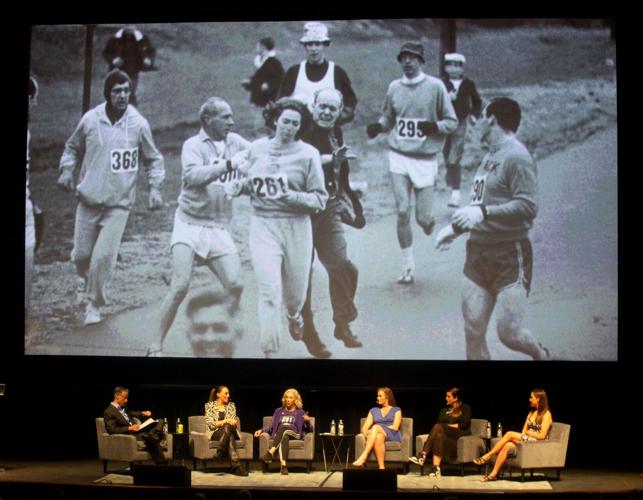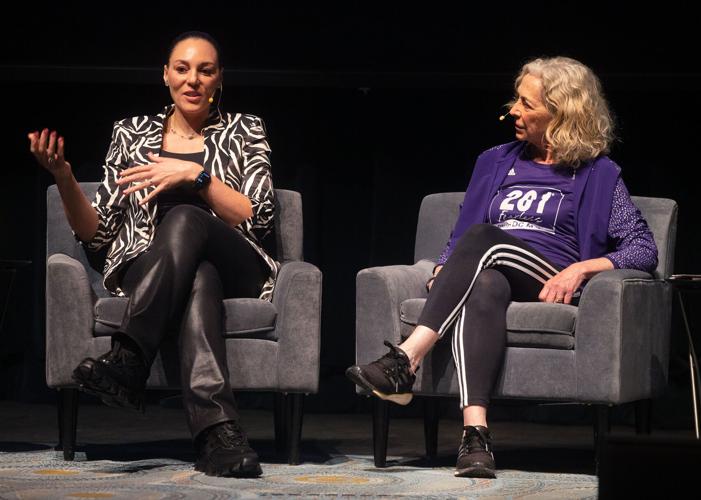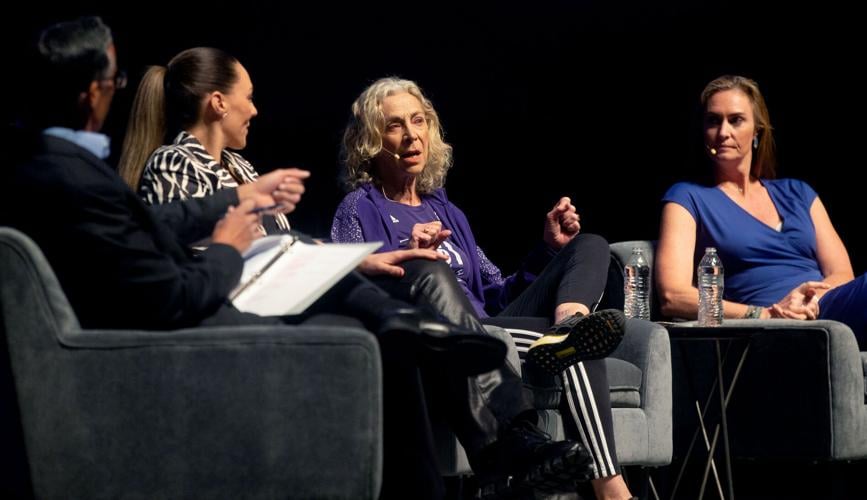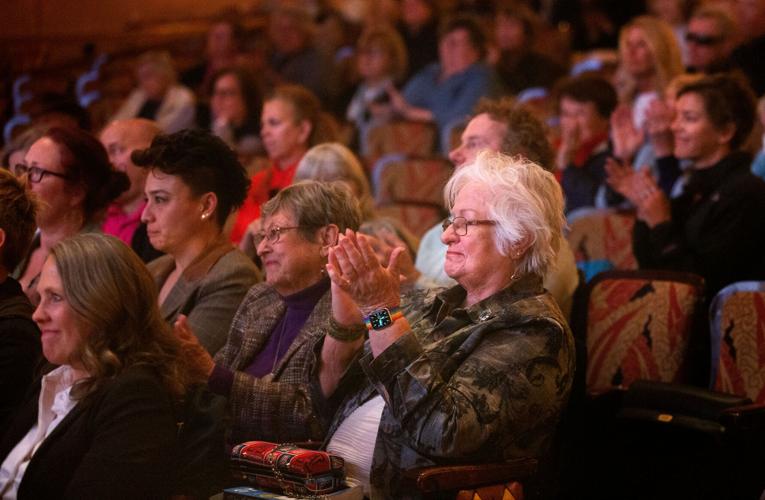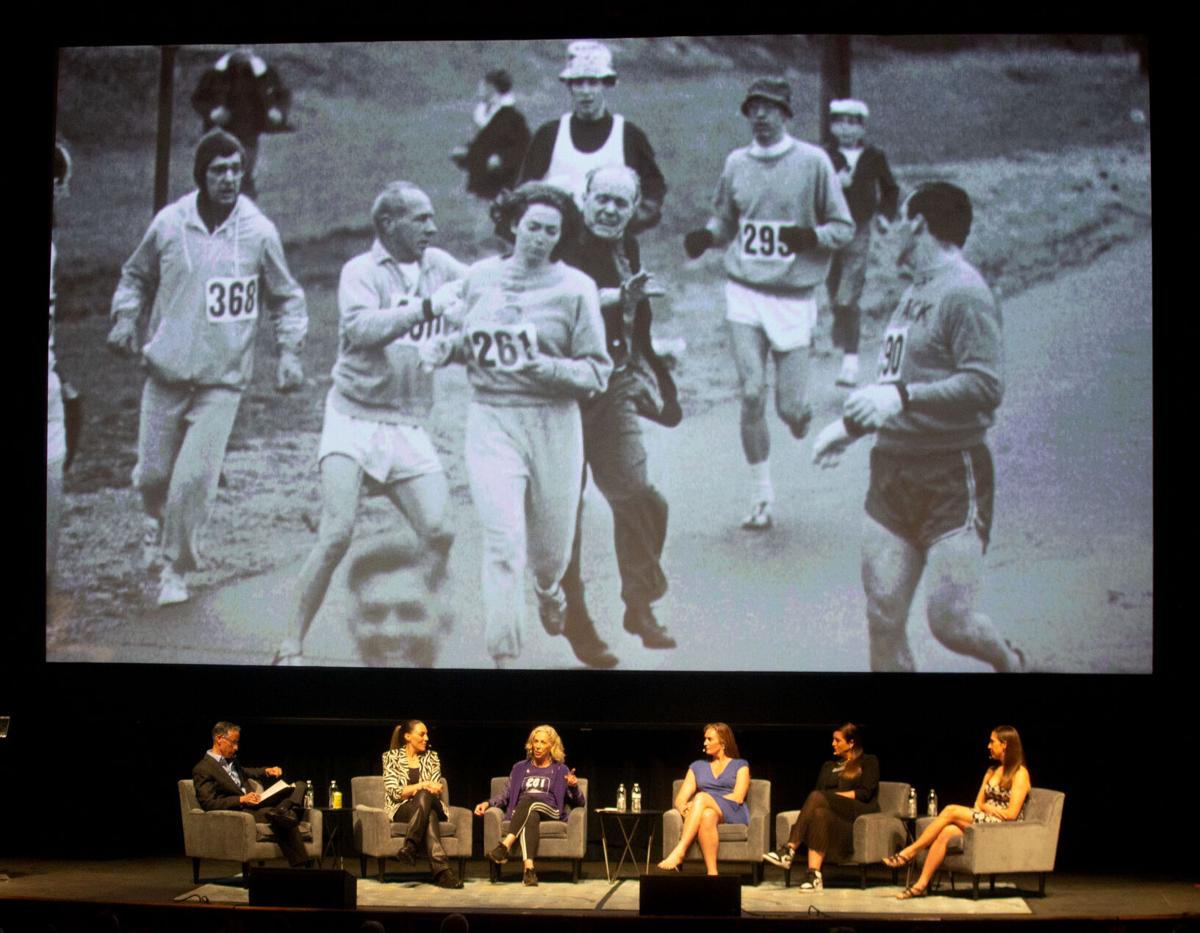Nearly 56 years after a Boston Marathon official tried to tear off Kathrine Switzer’s now-famous No. 261 bib and pull her out of a race run exclusively by men to that point, women’s basketball players from LSU and Iowa were asked to play the 2023 NCAA title game in front of ABC cameras — and 9.9 million people tuned in to watch.
That’s progress. During a discussion on women’s equity in sports on Wednesday at the Fox Theatre, ESPN’s Sarah Spain also cited the fact that women are now general managers, owners, and play-by-play broadcasters throughout the sports world.
Except all five of the panelists — which included Switzer, Tucson-based women’s sports advocate Kathryn Bertine and Arizona women’s basketball coach Adia Barnes — cited plenty of reminders, some subtle and others not-so-subtle, that there’s plenty of room for further change during the discussion sponsored by the UA Center for the Philosophy of Freedom.
“The ceiling is higher than ever … but the basement is really the same,” Spain said. “Every woman who comes into my business still is dealing with sexual harassment, sexual assault, disrespect, a lack of belief in that they care, that they can do the job. We just have to keep having conversations about it.
“To Kathrine’s point, it’s the same as trying to run a race and people pulling you out of it, to have a constant barrage of `You’re too fat, you’re too ugly,’ all these things that men just don’t have to deal with in the business, and how much talent is lost to that because they give up and go do something else.”
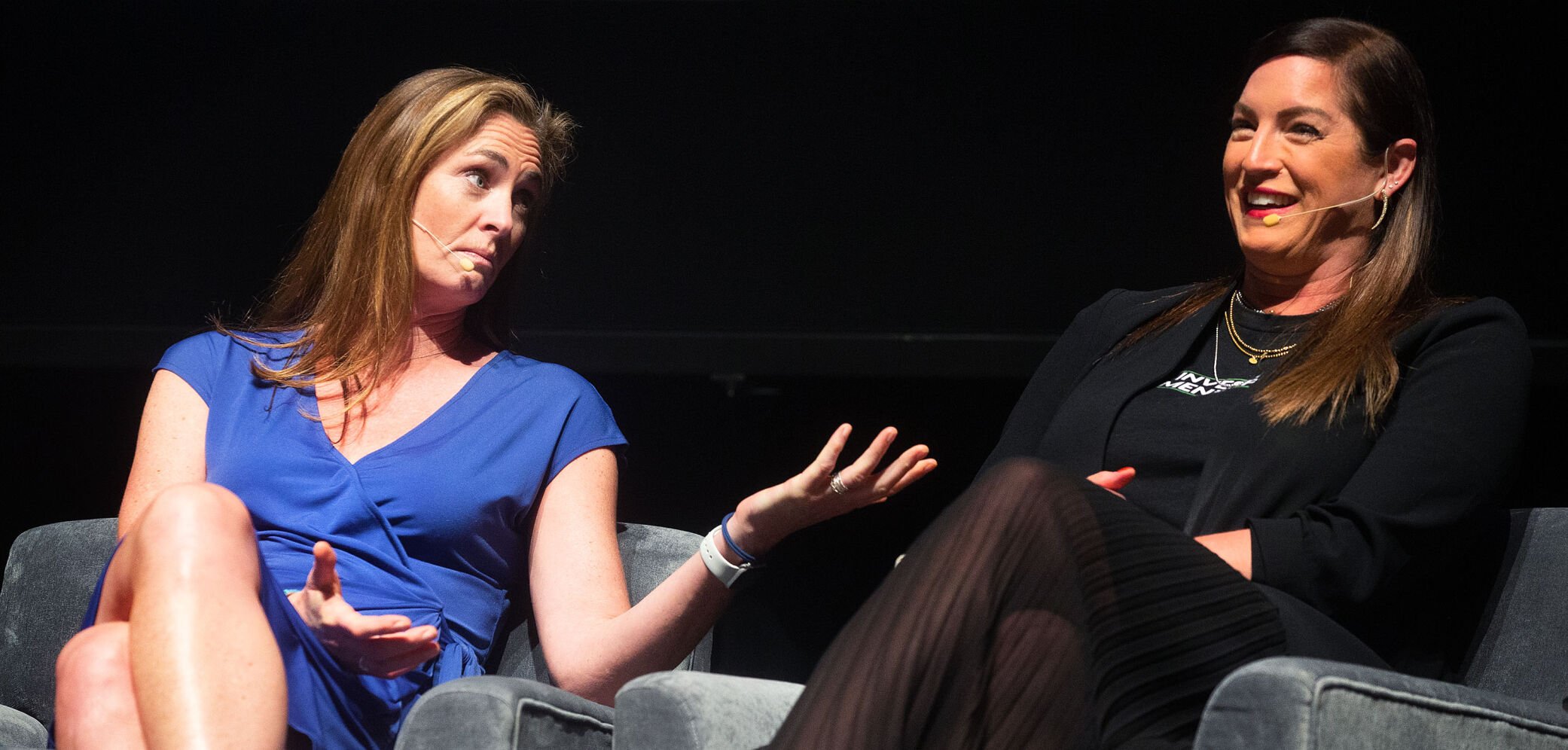
A.J. Mleczko, left, and Sarah Spain joke around during the Women’s Equity in Sports: The Fight, the Scars, and the Thrill of Victory panel at the Fox Theatre in Tucson on April 5, 2023.
Spain even found herself listening to the exact same comment that ESPN hockey analyst A.J. Mleczko received recently.
It was “I’m not a chauvinist. I just don’t like hearing sports come out of a woman’s voice,” Mleczko said.
“Oh,” Spain said, “someone told me that on a first date.”
That comment drew a mixture of gasps and chuckles from the Fox Theatre crowd of about 400 on hand for the early evening discussion. So did Mleczko’s story about how she would send select social media comments to her daughters, only to have her 19-year-old daughter sign up for Twitter and find out even more.
“She said, ‘Mom, I had no idea. This is awful. It’s a shame. It’s really vicious,’ “ Mleczko said. “The ones that I would send them were like, `You have a face for radio,’ or ‘You age like milk – you look really sour.’
“And when my daughter saw the really mean ones, it was (heartbreaking). She’s an adult legally and she can see this stuff, but there is some value in sharing that with my children and understanding that they don’t define me and my job.”

Kathrine Switzer, right, listens as Adia Barnes, coach of the Arizona women’s basketball team, talks about the inequalities she discovered during her team’s run to the national championship game in the 2021 NCAA tournament during the Women’s Equity in Sports: The Fight, the Scars, and the Thrill of Victory panel at the Fox Theatre in Tucson on April 5, 2023. The panel also included Kathryn Bertine, A.J. Mleczko and Sarah Spain, and was moderated by Damien Alameda.
Double standard
Spain said she has found using satire has been more effective in driving home points about equity than straight-out complaining. In 2016, Spain and fellow sports journalist Julie DiCaro recorded a video in which unsuspecting men were asked to read particularly hateful tweets in front of them that other men had written. Many wound up choking up and apologizing for words that often had to be bleeped out.
“The other women and I were stoic because we had heard them a million times,” Spain said. “The men were on the verge of tears. They didn’t know what they were going to be handed to read. They thought it was like a Jimmy Kimmel mean-tweets thing, but instead what they were reading were things like `I hope you get raped again. I hope your husband beats you. I hope your dog gets hit by a car. Do you talk about your rape because you want people to believe that anyone would want to have sex with you?’ Just the most awful things we’ve ever gotten.
“The men were so emotional. … If it had been us, it would have gone away like so many other things, where it’s ‘We’re just sick of hearing women tell us how bad it is.’ “
The discussion also touched on times when actions said more than words. Mleczko said she was covering an NCAA women’s “Frozen Four” hockey championship in New Hampshire in 2016 — but noticed that the winning players from Minnesota were given celebratory hats that said “Frozen Four Tampa 2016,” referencing the site of the men’s championship that year.
“They said it was cheaper to make one hat,” Mleczko said.
Having helped the U.S. win the first-ever gold medal awarded in women’s hockey during the 1998 Olympics, Mleczko was also once at a USA jersey reveal in which she said officials were “bragging about how cool it was” that the years that the men’s team won medals were sewn inside of the women’s jerseys.
“I was like `This is unacceptable,’ and they said, `Well, you know what we meant,’ “ Mleczko said. “They said `It’s too late now, Nike has already issued the jerseys. There’s nothing we can do about it.’ I said, `There’s no one in the room, there’s no one at Nike, there’s no one (in) a single meeting for design, there’s no one in any place anywhere who goes, “Hold on, wait, we’re making women’s jerseys” ‘ (that commemorate men’s accomplishments).”
Changes being made
Thanks to an athletic social-media influencer, one discrepancy in college basketball led to immediate change and a full-blown NCAA review of procedures. Oregon’s Sedona Prince posted a TikTok video during the 2021 NCAA Tournaments comparing a short stack of barbells for women with the full-blown weight room men’s players were offered, and the video went viral.
Barnes, who led the Wildcats to the Final Four that season, said women’s players were quickly offered 10 “nice” weight rooms but said she also started noticing other differences, such as food and room on travel charters. She said she was surprised to learn, too, that the NCAA used the “March Madness” branding only for the men’s side until 2022.

Kathrine Switzer, center, talks about registering to run in the Boston Marathon in 1967 as the first woman and the race director trying to stop her during the Women’s Equity in Sports: The Fight, the Scars, and the Thrill of Victory panel at the Fox Theatre in Tucson on April 5, 2023. The panel also included Adia Barnes, Kathryn Bertine, A.J. Mleczko and Sarah Spain, and was moderated by Damien Alameda.
“The tournament really opened up my eyes,” Barnes said. “Now I’m more conscious of it.”
Barnes said she also noted how, after four million viewers watched the Wildcats face Stanford in the 2021 title game, that potential revenue was limited because women’s basketball is bundled with other sports.
ESPN.com reported that ESPN had a rights deal with the NCAA to show all Division I championships, excluding men’s basketball and football, through 2023-24 for $34 million annually — but also quoted an independent media expert saying the annual broadcast rights for women’s basketball would be worth between $81 million and $112 million in 2025.
Those sorts of contractual arrangements, Spain suggested, can allow a sport to be pronounced a “money loser” despite growth.
“By using those numbers to argue that they don’t have to invest in it, they can continue to hold it back,” Spain said, also noting the difference in perception between the WNBA’s early iterations and the more heavily money-losing XFL.
“We treat men’s sports like a startup where we expect the ROI to take time to advance,” Spain said. “We treat women’s sports like it’s going to lose from the start, and then when it does, it’s a self-fulfilling prophecy.”
Spain said men’s sports are often an “opt-out” because of their heavy exposure, while lighter media coverage of women’s sports makes it harder for viewers to find them — or even know why they should.
Men’s sports are “gonna come at you all day — you have to decide not to listen to it,” Spain said. “Women’s (sports) are, `What site do I have to go to? What streaming service do I want?’ And the more that we just accept that and say this is why women aren’t successful is like giving our daughters one dollar and our sons five and then saying (to the daughter), `Well, honey, why isn’t your businesses as good?’

Members of the audience clap after Kathrine Switzer talked about registering to run in the Boston Marathon in 1967 as the first woman and the race director trying to stop her during the Women’s Equity in Sports: The Fight, the Scars, and the Thrill of Victory panel at the Fox Theatre in Tucson on April 5, 2023. The panel also included Adia Barnes, Kathryn Bertine, A.J. Mleczko and Sarah Spain, and was moderated by Damien Alameda.
“Duh. You also have centuries of patriarchal expectation for why men are great and why we should invest in them and that women don’t even belong in the space to run or to comment or to play.”
At that point, over an hour into the discussion, Spain stopped herself, saying, “I need to stop talking,” drawing laughs.
Progress weaved in and out of the discussion, too. Spain is, after all, also a co-owner of a National Women’s Soccer League franchise in Chicago, while Switzer was inducted into the National Women’s Hall of Fame for empowering women through running.
Even Bertine, lauded for leading the push for a women’s race at the Tour de France from her Tucson apartment, said she’s noticed fewer “trolls” commenting on her tweets about upcoming community cycling races with crude and disparaging remarks.
“It reminds me that it’s still worth it, to be out there putting our strong selves forward,” Bertine said. “Not letting people tear us down, but using it as a motivation. ... `No, I will succeed no matter what you say.’ “
<&rule>
Arizona softball players Blaise Biringer and Dakota Kennedy, in addition to coach Coach Caitlin Lowe, discuss the Wildcats' upcoming matchup with Stanford and the development of Biringer and Kennedy this season. The trio spoke April 4, 2023 at Rita Hillenbrand Stadium. Video by Devin Homer/Special to the Arizona Daily Star


